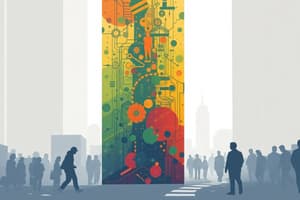Podcast
Questions and Answers
Which aspect is NOT a type of social inequality?
Which aspect is NOT a type of social inequality?
- Differences in levels of power
- Differences in levels of social capital
- Differences according to hair color (correct)
- Differences in levels of income
What is a common theoretical position regarding social inequality?
What is a common theoretical position regarding social inequality?
- Income differences are irrelevant to social outcomes
- Social capital does not influence inequality dynamics
- Ideological views often shape perceptions of inequality (correct)
- Inequality results from equal contributions to society
What does GDP represent within an economy?
What does GDP represent within an economy?
- The measure of wealth distributed among citizens
- The total number of businesses operating in the economy
- The average income of households within the economy
- The total value of goods and services produced over a specific duration (correct)
What was the percentage decrease in GDP for the UK compared to 2019?
What was the percentage decrease in GDP for the UK compared to 2019?
Which of the following is an outcome of social inequality?
Which of the following is an outcome of social inequality?
Which of the following is NOT a focus of the human development index?
Which of the following is NOT a focus of the human development index?
Which characteristic does NOT typically influence social inequality?
Which characteristic does NOT typically influence social inequality?
What factor is most strongly associated with personal wellbeing, according to UK research?
What factor is most strongly associated with personal wellbeing, according to UK research?
How can social capital influence social inequality?
How can social capital influence social inequality?
What critical aspect of development does the human development index now include?
What critical aspect of development does the human development index now include?
What factor is associated with increased vulnerability in times of crisis?
What factor is associated with increased vulnerability in times of crisis?
Which of the following statements about social inequality is accurate?
Which of the following statements about social inequality is accurate?
What has been documented as a significant impact on UK's wellbeing in 2020?
What has been documented as a significant impact on UK's wellbeing in 2020?
Which characteristic could contribute to enhanced social status?
Which characteristic could contribute to enhanced social status?
According to the content, what misconception exists regarding income and wellbeing?
According to the content, what misconception exists regarding income and wellbeing?
What aspect does the ecological footprint measure in relation to health and wellbeing?
What aspect does the ecological footprint measure in relation to health and wellbeing?
How do contemporary social norms influence personal definitions of 'needs'?
How do contemporary social norms influence personal definitions of 'needs'?
Which type of inequality is illustrated by the income disparity between the lowest and highest income households?
Which type of inequality is illustrated by the income disparity between the lowest and highest income households?
What does the term 'social capital' refer to in the context of social inequality?
What does the term 'social capital' refer to in the context of social inequality?
Which statement best describes the status faced by the Dalits in India?
Which statement best describes the status faced by the Dalits in India?
What impact can the lack of access to clean drinking water have on populations?
What impact can the lack of access to clean drinking water have on populations?
In what way has the Trump administration affected LGBTQI+ rights in 2021?
In what way has the Trump administration affected LGBTQI+ rights in 2021?
How are different characteristics such as gender or ethnicity significant to individuals?
How are different characteristics such as gender or ethnicity significant to individuals?
Which statement about social inequality is true regarding resource access globally?
Which statement about social inequality is true regarding resource access globally?
What is the primary influence of relative poverty on individuals?
What is the primary influence of relative poverty on individuals?
How do families without work generally perceive employment?
How do families without work generally perceive employment?
Which statement reflects a common misconception about work and poverty?
Which statement reflects a common misconception about work and poverty?
What is a potential consequence of individuals comparing themselves to earlier generations?
What is a potential consequence of individuals comparing themselves to earlier generations?
What is a criticism of the focus on cultures of worklessness by policymakers?
What is a criticism of the focus on cultures of worklessness by policymakers?
What does subjective inequality often contribute to in society?
What does subjective inequality often contribute to in society?
Which aspect of in-work poverty is highlighted as affecting children?
Which aspect of in-work poverty is highlighted as affecting children?
What critical view is proposed regarding current social change and relative inequality?
What critical view is proposed regarding current social change and relative inequality?
What is a common concern regarding the impact of COVID-19 on social inequality?
What is a common concern regarding the impact of COVID-19 on social inequality?
Which statement best describes the relationship between social inequality and its societal effects?
Which statement best describes the relationship between social inequality and its societal effects?
In understanding social inequality, what should be emphasized according to contemporary discussions?
In understanding social inequality, what should be emphasized according to contemporary discussions?
What does the evidence base suggest about social inequality, despite debates on its measurement?
What does the evidence base suggest about social inequality, despite debates on its measurement?
How should individuals reflect on their own perspectives regarding social status and possession?
How should individuals reflect on their own perspectives regarding social status and possession?
What might be a relevant consideration for restructuring capitalism in relation to social inequality?
What might be a relevant consideration for restructuring capitalism in relation to social inequality?
What is a crucial factor in the measurement of social inequality?
What is a crucial factor in the measurement of social inequality?
What should individuals consider to accurately assess their societal position regarding inequality?
What should individuals consider to accurately assess their societal position regarding inequality?
Flashcards are hidden until you start studying
Study Notes
Defining Social Inequality
- Social inequality is defined as the differences in levels of income, resources, power, status, social capital, and social inclusion/exclusion among individuals and groups.
- These differences are often influenced by factors like gender, ethnicity, and age.
- Social inequality can be measured using various methods, but one common approach focuses on socioeconomic frameworks to measure income disparities.
Key Learning Outcomes
- Understand the concept of social inequality as a complex and multifaceted issue.
- Recognize the various types of social inequalities that exist in society.
- Gain insight into both the theoretical and ideological perspectives that shape our understanding of inequalities.
Conceptualising Social Inequality
- The world is characterized by unfairness and inequality, with evidence highlighting the myriad ways in which these inequalities manifest.
- Despite the existence of this evidence, there is ongoing debate about how to conceptualize and understand social inequality.
- Social inequalities can be understood through socioeconomic frameworks that examine income discrepancies.
Measuring Social Inequality
- Table 1.1 provides examples of different types of social inequalities and evidence supporting their existence.
- Examples of Evidence:
- In the UK, income disparity is significant. In 2018, the top 20% of the population had an average equivalised disposable income six times higher than the bottom 20%.
- Globally, millions lack access to safe drinking water, risking their health and lives.
- Power imbalances exist, with certain groups facing social silencing or discrimination based on their identity.
- Access to social capital, such as networks of power, can lead to unequal outcomes, like in board memberships where women are often excluded.
Comparing Development
- The Human Development Index (HDI) provides a broader measure of development than simply relying on GDP.
- HDI considers factors such as health, education, and living standards, capturing the capabilities of individuals and including environmental sustainability.
Understanding In-work Poverty
- In-work poverty refers to individuals working but still living in poverty.
- This challenges the narrative that work is the sole solution to poverty, as many families struggle despite employment.
- In-work poverty can have detrimental effects on children, contributing to child poverty.
Subjective Inequality
- The experience of inequality is subjective and comparative, meaning individuals perceive inequality relative to others.
- People often compare themselves to their reference groups, like neighbors, friends, or past generations, affecting their perceptions of inequality and well-being.
Summary of Key Points
- Measuring and understanding social inequality is a complex process, but there is a clear evidence base demonstrating its existence.
- Global patterns of social inequality are evolving, but there are growing concerns about the potential for COVID-19 to worsen inequalities.
- Social inequalities have negative consequences both for individuals experiencing them and for society as a whole.
Further Reading
- Dorling, D. (2018) Peak Inequality: Britain's Ticking Time Bomb.
- The Atlas of Inequality
- Wilkinson, R. and Pickett, K. (2019) The Inner Level: How More Equal Societies Reduce Stress, Restore Sanity and Improve Everyone's Well-being.
List of Questions to Stimulate Debate and Reflection
- Should we focus more on wealthier groups and political power to better understand how inequalities are perpetuated?
- How does comparing ourselves to others affect our perceptions of inequality and societal position?
- Considering the persistence of inequalities, should we reconsider the functioning of capitalism as an economic model and explore ways to achieve more equitable wealth distribution?
Studying That Suits You
Use AI to generate personalized quizzes and flashcards to suit your learning preferences.




